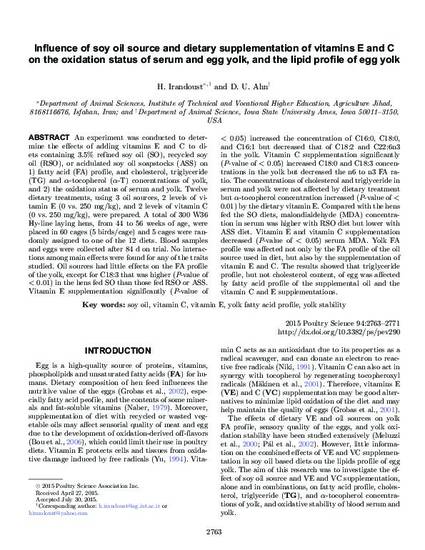
An experiment was conducted to determine the effects of adding vitamins E and C to diets containing 3.5% refined soy oil (SO), recycled soy oil (RSO), or acidulated soy oil soapstocks (ASS) on 1) fatty acid (FA) profile, and cholesterol, triglyceride (TG) and α-tocopherol (α-T) concentrations of yolk, and 2) the oxidation status of serum and yolk. Twelve dietary treatments, using 3 oil sources, 2 levels of vitamin E (0 vs. 250 mg/kg), and 2 levels of vitamin C (0 vs. 250 mg/kg), were prepared. A total of 300 W36 Hy-line laying hens, from 44 to 56 weeks of age, were placed in 60 cages (5 birds/cage) and 5 cages were randomly assigned to one of the 12 diets. Blood samples and eggs were collected after 84 d on trial. No interactions among main effects were found for any of the traits studied. Oil sources had little effects on the FA profile of the yolk, except for C18:3 that was higher (P-value of < 0.01) in the hens fed SO than those fed RSO or ASS. Vitamin E supplementation significantly (P-value of < 0.05) increased the concentration of C16:0, C18:0, and C16:1 but decreased that of C18:2 and C22:6n3 in the yolk. Vitamin C supplementation significantly (P-value of < 0.05) increased C18:0 and C18:3 concentrations in the yolk but decreased the n6 to n3 FA ratio. The concentrations of cholesterol and triglyceride in serum and yolk were not affected by dietary treatment but α-tocopherol concentration increased (P-value of < 0.01) by the dietary vitamin E. Compared with the hens fed the SO diets, malondialdehyde (MDA) concentration in serum was higher with RSO diet but lower with ASS diet. Vitamin E and vitamin C supplementation decreased (P-value of < 0.05) serum MDA. Yolk FA profile was affected not only by the FA profile of the oil source used in diet, but also by the supplementation of vitamin E and C. The results showed that triglyceride profile, but not cholesterol content, of egg was affected by fatty acid profile of the supplemental oil and the vitamin C and E supplementations.
Available at: http://works.bepress.com/dong_ahn/118/

This article is published as Irandoust, H., and D. U. Ahn. "Influence of soy oil source and dietary supplementation of vitamins e and c on the oxidation status of serum and egg yolk, and the lipid profile of egg yolk." Poultry science 94, no. 11 (2015): 2763-2771. doi:10.3382/ps/pev290.